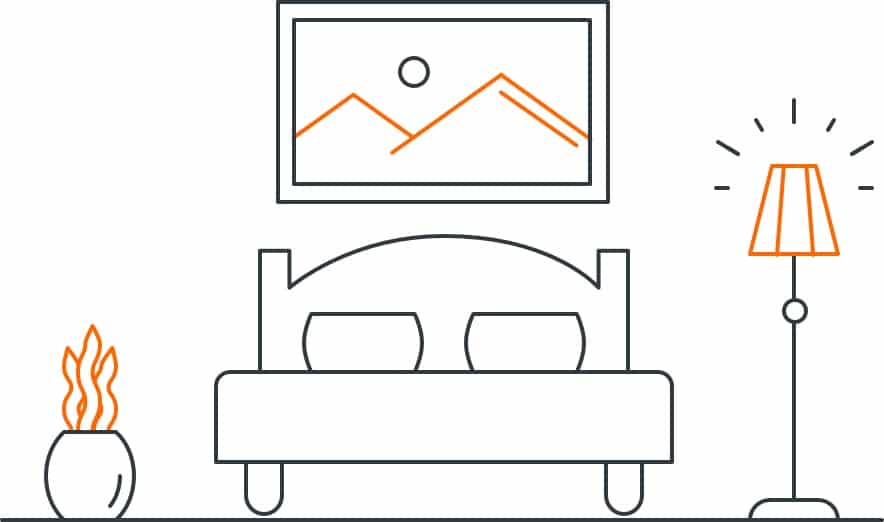The Ultimate Guest Experience Guide for Hotel Management

Whether you actively recognize it or not, the communication system you put in place for your business greatly impacts your long-term success. Though this is generally true, rarely is this correlation stronger than when it comes to the hospitality industry. In particular, creating a guest experience that stands above the rest.
The lengths to which your staff connects to your guests directly plays into both customer satisfaction and the overall guest experience. However, the internal communication among your team itself can affect your productivity, your bottom line and, ultimately, the quality of your service.
To give you a fuller picture of the many ways in which your hotel staff’s communication — both within your team and with guests — can affect your daily operations, we’ll delve into some key considerations you need to have in mind going forward. We’ll address the communication tools you can choose, common pitfalls that may stand in your way and some creative solutions to optimize your operation.
In short, by the time we’re through, you’ll have some key takeaways that you can apply to your communication efforts to bring it to astounding new heights.
To jump ahead to any section you find most relevant you can click on the links below:
1. How Does Your Team Communicate?
2. Communication Setbacks to Watch Out For
3. How To Put Your Guests First
4. The Role of the Guest Experience
5. How to Go Above and Beyond to Increase Guest Satisfaction
6. Tales from Housekeeping: How to Avoid a Nightmare Scenario
How Does Your Team Communicate?
If you ever hope to make the most of your hotel staff, the first step is to identify the best tool for the job. While the answer may have once been a foregone conclusion, you now have a number of options available to you, each with their own strengths and weaknesses. So let’s take a closer look at what you have to choose from.
![]() Walkie talkies: These handheld two-way radios have long been the easy answer for hotel staff like yours. However, the technology is quickly becoming obsolete, despite their ability to connect instantly. Carrying around bulky, often-expensive equipment is becoming less of a necessary trade-off than ever before.
Walkie talkies: These handheld two-way radios have long been the easy answer for hotel staff like yours. However, the technology is quickly becoming obsolete, despite their ability to connect instantly. Carrying around bulky, often-expensive equipment is becoming less of a necessary trade-off than ever before.
![]() Task management software: The modern answer to keeping your productivity up, you have to hand it to task management software as far as accuracy and ease of use. Still, there’s the limited mobility that you need to contend with instead. Moreover, because many systems are not available on mobile devices, accessibility is a concern too.
Task management software: The modern answer to keeping your productivity up, you have to hand it to task management software as far as accuracy and ease of use. Still, there’s the limited mobility that you need to contend with instead. Moreover, because many systems are not available on mobile devices, accessibility is a concern too.
![]() Phones: Using your hotel’s phone system certainly lacks the elegance of more technologically savvy solutions. But there’s no arguing for its relative effectiveness. If you’re hoping to track communications, the scattered nature of your phones makes that nearly impossible. Of course, your staff also need to stay at their desks to answer.
Phones: Using your hotel’s phone system certainly lacks the elegance of more technologically savvy solutions. But there’s no arguing for its relative effectiveness. If you’re hoping to track communications, the scattered nature of your phones makes that nearly impossible. Of course, your staff also need to stay at their desks to answer.
![]() Email: This approach too likely hinges on your team’s availability from a specific location. When it comes to your team’s communication, you need a solution that will keep your entire staff a moment’s contact away without requiring your employees to be at a desk or restricted from the everyday course of their duties.
Email: This approach too likely hinges on your team’s availability from a specific location. When it comes to your team’s communication, you need a solution that will keep your entire staff a moment’s contact away without requiring your employees to be at a desk or restricted from the everyday course of their duties.
 Walkie talkie app: Of course, we’re biased when it comes to the effectiveness of a mobile app that serves the same function as a traditional walkie talkie. However, the way in which it combines instantaneous communication with message tracking and mobility neatly consolidates all the benefits of the above approaches with minimal restrictions.
Walkie talkie app: Of course, we’re biased when it comes to the effectiveness of a mobile app that serves the same function as a traditional walkie talkie. However, the way in which it combines instantaneous communication with message tracking and mobility neatly consolidates all the benefits of the above approaches with minimal restrictions.
In the sections ahead, we’ll take a deeper dive into these solutions and how they may or may not be beneficial in solving common communication issues and bringing a higher level of service to your hotel.
Beware of These Setbacks
Regardless of what your workplace is like, you’re going to face communication issues now and again. So the best way to counter them is to anticipate them before they ever happen. In order to stay ahead of some of the most common communication pitfalls, let’s call each one out and, hopefully, identify simple solutions you can use to minimize their disruption to your workday.
- Delayed Communication: Perhaps nothing’s worse than needing immediate assistance for an emergency or guest request and receiving the help you need too late. This is, after all, the primary benefit of walkie talkies, and if you can’t count on your ability to reach your team on a whim and stay productive, it might be time for a communication upgrade.
- Miscommunication: So maybe your message arrives at its destination in a timely manner. But what if it’s difficult to hear, read or otherwise understand. If the intention behind your message doesn’t come across, you could wind up investing in a tool that serves no purpose at all. Essentially, you need a tool that maintains a secure signal.
- Missed Messages: What do you do if you attempt to reach a staff member and the message gets lost in cyberspace? Even with modern solutions, the mysterious case of the ‘missing message’ is a nagging concern. But when you have message tracking features and an archive to save and store messages, you can minimize this problem.
- Limited Mobility: Whereas other workplaces may be generally stationary, your hotel is a mecca of responsibilities extending from the front desk to each room. With so many tasks at hand, it’s foolish to expect your staff to remain seated by their phone or logged into their email. You need a tool they can take with them as they tend to their work.
- Costly Equipment: Expenses are high when you run a hotel. So any opportunity to trim the fat is welcome. To that end, walkie talkies can really eat into your budget, especially if they require repairs and maintenance. Instead, consider a walkie talkie app, which is installed on smart devices, and is more effective (and cheaper) than the alternative.
Put Your Guests First
Every decision you make with regards to your hotel, its staff and its operation should ideally be filtered through the prism of one single question: does this enhance the guest experience? Without the loyalty of your customers, your business would cease to profit at all.
So you should always be trying to find ways to draw guests in and keep them coming back time and again. Here are a few creative ideas to get you started.
Enhance Your Communication Toolkit
As we’ve already discussed above, the communication among your staff is, in many ways, the lifeblood of your hotel. Until you nail down a strategy that works among your team, you’re bound to run into recurrent issues when it comes to providing the best guest experience you can. Start by implementing some oversight and closely monitoring your efforts to date. In other words, walkie talkies just might not cut it anymore.

On the other hand, walkie talkie apps provide a sleek, affordable solution that retains what you loved about two-way radios and updates it with the mobility and quality of more modern communication tools. With a stronger system in place to submit messages to your team, you’re already starting off much better equipped to pass those benefits on to your guests, ultimately improving your guest experience as a result.
Build a Relationship with Your Guests
To realize the true potential of your hotel to stand out among an overcrowded marketplace, you need to do more than just introduce a new communication tool. Check-in with guests throughout the course of their stay, for example. That will help you develop a long-term relationship that lets guests know beyond all doubt how much you appreciate their business and naturally encourages them to return.
Relationships are integral to all business transactions, and in your hotel, you could work wonders on your connection with guests simply by sending out automated emails, texts or phone calls to build a rapport. You don’t have to invest a ton of money to keep guests happy. In fact, in many respects (as we’ll discuss shortly), the little things accumulate to make a more significant difference than a grand, sweeping gesture to win over guests.
Provide Easy, Inexpensive Amenities
Remember how crowded the market is for hotels. Your guests have a lot to choose from. So you want to do whatever you can to make them feel welcome as soon as they step through your doors. Simple touches like freshly baked cookies or other treats available upon check-in or even just a fresh pot of coffee waiting in the lobby go a long way to create a warm atmosphere, communicating your mission without a single word.

More expensive amenities like a pool or a fitness room also do the trick, but even a low-cost option like free Wi-Fi can make a positive first impression. The end result is that your guests will get a sense of home when they stay at your hotel, and appealing to their emotions is one of the surest ways to ensure that new guests will return to experience that same attentive service again in the future.
Keep the Lines of Communication Open
Just as it is critical which mode of communication your staff uses to stay productive and on task day in and day out, you want to encourage past, current and future guests to reach out to you whenever they need anything. Thankfully, modern technology makes it all too easy for you to open the communication lines between your staff and your guests. You need only take the time to consider how to leverage your options to do so.
In today’s day and age, you have no excuse not to offer extended (or even 24-hour) hours for your staff to respond to text or online messages. At the very least, make an effort to offer multiple ways for guests to reach out with a service request, a simple question or even general feedback about your hotel and/or their stay there. This kind of personalization helps guest feel like they’re being heard and acknowledged.
The Role of the Guest Experience
The guest experience, as we’ve illustrated, is often the source of your hotel’s competitive edge and needs to be protected at all costs. By first recognizing the critical role that communication plays in your hotel and taking action to improve it, you’re looking out for the relationship you share with your guests. Let’s run through some common scenarios and how they can be improved with a quality communication system.
Scenario #1
A guest approaches the front desk with a timely concern that needs to be addressed. The staff member smiles cordially and says they’ll be with the guest in a moment, only to promptly disappear in the back. After waiting a reasonable amount of time, the customer leaves enraged and writes a bad review, vowing never to return to your hotel again.
This is a classic case of delayed communication. The guest came down to the front desk with a specific request, which was neglected and never resolved. Instead of risking this scenario, a better way to handle this would be to address the guest’s needs in real time. If you are understaffed, your hotel staff should reach out to a teammate for assistance.
Scenario #2
A traveler is planning a visit to your hotel but has to make a change to their reservation. Whether it’s a special request for the room or they want an early check-in, it’s up to you to respond and honor that request as quickly as possible. If no one answers and the guest’s voicemail is never received either, you’re in trouble with the guest experience.
At this rate, the guest may not have a room when they arrive or at least one that meets their request. As we already mentioned, missed messages are one of the biggest concerns for hotel staffs. If you are using an unreliable communication system, then your guest will likely be the one to pay the price, setting a bad tone for their stay.
Scenario #3
When you have a limited number of staff members on duty, it sure is tempting to try and cover all your customer service bases even with limited resources. If a guest needs a staff member to stop by the room to address a request but a sole worker is alone at the front desk, you’re bound to leave a guest unsatisfied. But if you can contact another staff member for help, you’re all set.

Unfortunately, the limited mobility of this scenario prevents you from tending to both guests. A walkie talkie app solves this easily though, as its mobility and instant communication capabilities mean you can be reachable even if you need to leave the front desk for a moment to tend to something. This would allow you to assist any incoming guests who require your attention.
Scenario #4
When a guest has a question, they need to feel confident dialing up the front desk. If they do and your staff is unhelpful, terse or even rude, the phone conversation may escalate to the point, leading the worker to flat out deny the guest’s request. What should have been a quick, pleasant call spiraled into a negative interaction.
In this case, the staff member was not behaving in a way befitting the mission of your hotel, hence miscommunication strikes again. To make it as a successful hotel long-term, you’ll need to establish and maintain the kind of warm attitude that lets guests feel heard and satisfied even if they don’t get all their requests met.
Going Above and Beyond
To stand out among your competitors, you really have to go that extra mile to enhance your guest experience. You could punch up your budget, but if you’re like most hotel managers, what you need most are creative ideas to improve your hotel’s guest experience. However, don’t worry. Let’s explore some easy ways to wow your guests and transform them into regular customers.
Simple amenities: We already touched on this a bit earlier, but the relative impact you can make with such small purchases deserves another mention. While ideas like free coffee, mints on guests’ pillows and other shows of appreciation are not groundbreaking, instituting at least one or two of these little acts of kindness can snowball into a positive experience that leaves guests feeling extra special.
Free Wi-Fi: If you don’t already offer this little feature, consider yourself one of the few remaining hold-outs. Most guests may assume that you already include free Wi-Fi in their stay, and not having it might undercut some of your business potential. Nowadays, offering free Wi-Fi doesn’t really extend your cost much and demonstrates your commitment to making the guest experience a priority.
Frequent status updates: When it comes to something as critical as one’s travel plans, you can rarely ever over-communicate with your guests. A phone call, email or even text message before their stay is an easy way to address any concerns or questions a guest may have prior to their arrival. Continue this outreach during their stay and after they leave, at which point you can even elicit feedback to optimize your business for the next round of guests. You want to learn as much as possible about each guest’s experience.
Streamlined processes: The more time you spend getting things done behind the scenes, the less you’re devoting to serving your guests with the best possible experience. Although you might not initially see how it affects your guest experience, you should be persistently proactive when it comes to simplifying your back-end administrative processes, including — you guessed it — your in-house communication. You’ll be surprised how it liberates your team to get the job done better than ever.
Personalized services: Especially given the ease with which other businesses do so, you want to personalize your services as much as possible. Begin with little things like training your front desk staff to use the guest’s name, and progress onward to customized marketing messages, special discount offers or a simple thank you. Such actions make it apparent to your guests that you value them as individuals.
Loyalty program: Consumers want to enjoy a deeper experience when they patronize a specific business. Having any kind of loyalty program — likely involving a points system that translates into discounts or freebies — is a terrific way to build your brand and deepen your relationships with existing customers. A loyalty program encourages consumers to stay at your hotel, propelling you into a state of exponential growth.
Ability to meet special requests: If possible, your staff should aim to accommodate special requests (for an additional fee, of course), such as flowers in the room or a champagne delivery for guests on romantic trips. This may involve many staff members to coordinate, but this is the perfect reason to invest in an upgraded communication system. You want your guests’ experience to be as special and memorable as possible.
Tales from Housekeeping: How to Avoid a Nightmare Scenario
With any luck, the above discussion has offered you a greater understanding of just how pivotal the communication among your staff and with your guests is to your overall productivity and guest experience. For example, here are a few scenarios involving your housekeeping staff that can be avoided with the right toolkit by your side.
Scenario #1
One of the most common requests that hotel staffs tend to accommodate is the early check-in. If you do have a room available a few hours early, it only benefits you to offer it to your guests as long as the room has been properly cleaned and supplied. To ensure that this is taken care of, your housekeeping needs a heads-up so that they can ensure that everything is clean, in order and ready to receive the incoming guests. But if the housekeeping staff never receives the message, the room is not cleaned on time, and your guests are forced to wait in the lobby or return later, reflecting poorly on your management and, by extension, your hotel itself. On the other hand, the room very well may be ready for its next guests. But if you don’t have clear communication back from housekeeping that this is the case, your guests are left waiting in the lobby.
Scenario #2
Let’s say a spill occurs in one of the common areas, where you have tile or another slick surface on the floor. The guest responsible reports the spill to the front desk, and a general message is sent out to the housekeeping staff to clean it up before someone gets hurt.
Of course, because each staff member is tied up with other tasks, they may not hear the initial message, as they may be on break or involved in other work at that moment. By the time the front desk does follow up, someone has already slipped and hurt themselves. Through no fault of the housekeeping staff, this delayed communication now leaves the hotel open to guest complaints as well as perhaps a liability issue.
Scenario #3
With so many rooms occupied, it doesn’t take much for something to go wrong or for a message to get lost in the shuffle. Say, for instance, that a guest is set to arrive shortly after regular check-in time. The front desk confirms the reservation and so dispatches a member of the housekeeping staff to prepare the room. Naturally, it’s a particularly busy day, and the staff doesn’t get there until soon before check-in time to change the sheets, clean up and the rest of the standard services.
But, due to a garbled message or some other miscommunication, your staff actually prepares the wrong room. Now your guests arrive, and you don’t have a room ready for them. A reliable communication system might have prevented this kind of mishap. Instead, the housekeeping staff — and, of course, the guest — wind up penalized for a problem they’re not responsible for.
Scenario #4
Anytime a guest reaches out to express a simple need for supplies for their room, it’s vital that the communication between the front desk and your housekeeping staff remain intact. However, if the front desk is unable to be reached, this creates a disconnect that causes undue distress for the housekeeping staff. To avoid this, you need a system that will accept and retain messages.
You might not be fortunate enough to have such a system though, and as a result, you may miss messages entirely. Because of this, your guest’s request may never be met, lest they call repeatedly or even be forced to come down to the front desk to place it. Without the right communication system, the housekeeping staff is bound to encounter many, many instances in which they are unable to adequately respond to guests.
Scenario #5
When a guest calls for room service (or anything else, really), you need to be ready to either answer the call or call back in a moment or two to follow up. If miscommunication or delayed communication invades this process, your entire staff might make mistakes. After all, there’s a lot more to room service orders than simply accepting the call and delivering the correct order. You also have to ensure that the housekeeping staff is kept up to date on each delivery so that they can swing by for clean-up purposes. Your priority needs to be on delivering consistently strong service, and room service is the ultimate test of that. No one wants to have to deal with the lingering odor and unpleasant sight of a pile of messy dishes once they are done.
We understand that running a hotel is an arduous task, but to keep your business on an upward trajectory, you must be willing to evaluate your systems and explore alternative approaches that might yield a better return on your investment.

